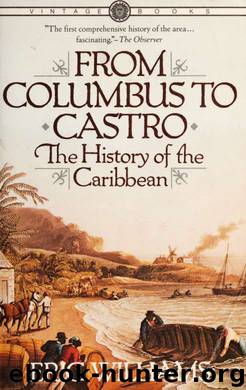From Columbus to Castro : the history of the Caribbean, 1492-1969 by Williams Eric Eustace 1911-

Author:Williams, Eric Eustace, 1911-
Language: eng
Format: epub
Tags: West Indies -- History.
Publisher: New York : Vintage Books
Published: 1984-03-13T16:00:00+00:00
From Columbus to Castro
gradualism. Its president was the Due de Broglie; one of its two vice-presidents was the economist, Hippolyte Passy; its most distinguished members were the poet, Alphonse de Lamartine, and the political scientist, Alexis de Tocqueville, the famous author of Democracy in America.
In 1833 Passy unsuccessfully proposed the freedom of all slave children born after that date and legal provision for manumission at prices fixed by the metropolitan government. A proposal by de Tocqueville in the following year for gradual emancipation in ten years, with compensation to the planters, did not even reach the stage of discussion. In 1840 the government appointed a commission, with the Due de Broglie as chairman, to study the question. The commission took three years to produce its report, whose vague conclusions satisfied nobody. In 1845 the government made provision for compulsory manumission, limited corporal punishment, and made elementary and religious instruction for the slaves mandatory. The slaves belonging to the State were freed in 1846 and 1847.
At this juncture, with events moving rapidly towards the denouement of the revolution of 1848, the abolitionist leadership passed into the hands of Victor Schoelcher, who was at one and the same time the Clarkson and the Wilberforce of France, the propagandist and political leader. Like Clarkson, a prolific writer and pamphleteer in a cause which he regarded as a crusade, he had travelled widely in slave areas: Mexico, Cuba, the United States and the French West Indies. His most important works are Slavery of the Negroes and Colonial Legislation, published in 1833; French Colonies: Immediate Abolition of Slavery, in 1842; and History of Slavery during the last Two Years, in 1847.
Beginning as a supporter of gradual emancipation, Schoelcher became the intransigent advocate of immediate abolition. Galvanising the entire country into action, with the aid of committees set up in all departments, he presented his ‘sixteen points’ to the legislature on August 30, 1847. The gospel according to Schoelcher reads as follows:
‘Property of man in man is a crime.
‘The inadequacy and danger of the so-called preparatory measures adopted are manifest.
‘These preparatory measures have not fully been put into force.
Download
This site does not store any files on its server. We only index and link to content provided by other sites. Please contact the content providers to delete copyright contents if any and email us, we'll remove relevant links or contents immediately.
| Africa | Americas |
| Arctic & Antarctica | Asia |
| Australia & Oceania | Europe |
| Middle East | Russia |
| United States | World |
| Ancient Civilizations | Military |
| Historical Study & Educational Resources |
Where Black Rules White by H. Hesketh-Prichard(372)
Boats, Borders, and Bases by Loyd Jenna M. Mountz Alison(313)
Boats, Borders, and Bases by Jenna M. Loyd & Alison Mountz(295)
Black Labor, White Sugar: Caribbean Braceros and Their Struggle for Power in the Cuban Sugar Industry by Philip A. Howard(245)
The Slaves Who Defeated Napoleon by Girard Philippe R(237)
The Haitian Revolution and the Early United States by Dillon Elizabeth Maddock; Drexler Michael;(227)
